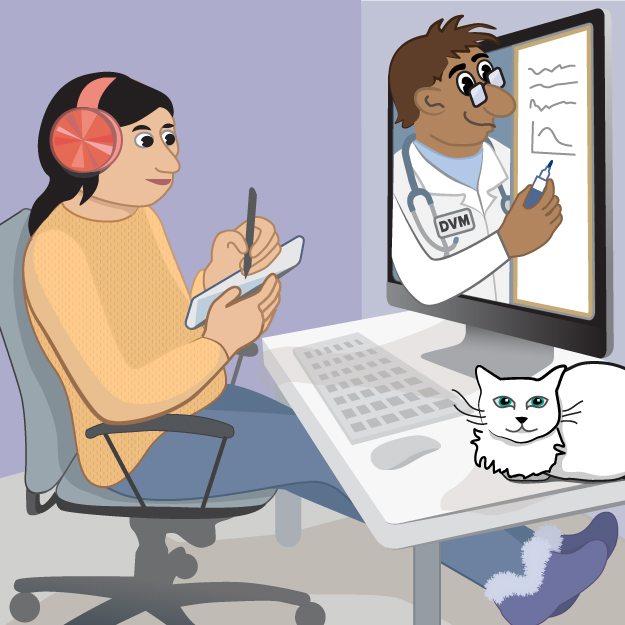AVMA accreditation does not encompass distance learning. Should it?
!This story has an important update.
Art by Tamara Rees

 Listen to this story.
Listen to this story.
Long before Zoom became a household name, Dr. Lance Roasa proposed to the veterinary schools where he was an itinerant teacher that he provide instruction over the internet. As he recalls, there was little interest.
Then came the Covid-19 pandemic lockdown. Suddenly, online was the only way educational institutions could keep teaching.
Today, nearly five years later, the global health emergency is over and in-person life is back in full swing, but elements of the virtual classroom remain. Faculty at established schools commonly allow students to attend class remotely or listen to recordings of lectures after the fact. And at least one planned new veterinary school — at Hanover College in Indiana — is predicated on a hybrid design that combines remote with in-person instruction.
The trouble is, the only accreditor of veterinary schools in the United States — the American Veterinary Medical Association Council on Education — isn't authorized to accredit distance learning.
In other words, U.S. veterinary schools with existing AVMA COE accreditation and those that seek it cannot be accredited by the organization if they provide instruction remotely. According to the AVMA, that includes hybrid approaches that allow students the choice to attend in person or virtually and those in which the instructor sometimes teaches from off-premises.
Students at unaccredited programs cannot access federal financial aid, and graduates of unaccredited schools face more hurdles to qualify for a professional license.
The remote-instruction hitch came to the fore during a recent review of the COE by the U.S. Department of Education, which confers recognition of educational accreditors in the country. In August, the Department of Education granted re-recognition to the COE, at the same time requiring it to submit a compliance report in one year's time to address areas in which it is not adhering to federal requirements. Distance education is one.
"[A]s it is not currently within the COE's scope to accredit programs delivering distance education, it was determined that the COE was out of compliance in this area," the AVMA explained in a written response to questions from the VIN News Service.
The AVMA elaborated that there has long been a federal requirement for accreditor oversight of education delivered remotely. "[F]lexibilities were put in place by the Department of Education during the pandemic to allow accreditors and programs to adapt to a rapidly changing environment," the AVMA said. "Those flexibilities expired at the end of 2023. However, many programs have continued to use educational modalities that qualify as distance."
Now considering whether to seek to expand its scope to distance education, the COE is soliciting input from the veterinary community and the public. The deadline for comments is Jan. 13.
The AVMA said late last week that it has received hundreds of comments already, with more arriving daily.
One will be from Roasa, the traveling instructor, who now has much more experience teaching remotely. A lawyer and veterinarian, Roasa offers courses in jurisprudence, malpractice, contracts, ethics, business, finance and personal finance. He has appointments at 18 schools — a little over half of the veterinary programs in the country.
Classes at about half of his appointments are exclusively remote. "That means a 'flip-the-classroom' approach, with asynchronous delivery of materials, followed by a live Zoom interaction," he said, referring to enabling students to access materials at their convenience and the use of the now-ubiquitous audiovisual software. Only one school where Roasa teaches requires fully in-person instruction. The rest he delivers in hybrid fashion — partly online, with periodic on-campus sessions.
(Roasa also is co-founder of a continuing education business called drip.vet, which is today part of the Veterinary Information Network, an online community for the profession and parent of VIN News.)
Owing to his dual training in law and veterinary medicine, Roasa possesses an expertise that few schools have on faculty. But remote instruction these days isn't limited to courses by subject-matter experts in short supply. Roasa observed: "Some schools [were] very much 'We want to return to normalcy, and we want to return to as much live interaction as we can as soon as possible,' and others just did not."
Among the schools he's familiar with, Roasa estimates that 90% or more of courses are recorded, enabling students to keep up with class without being physically present. "And so students tend to not go to class and just watch the lectures later online, which is the same effect of having a distance education," he said.
As a provider of distance education, Roasa naturally supports its use — but not wholesale.
"If you go straight to online — and I can tell you, I have plenty of experience with just nothing but Zoom lectures and nothing but asynchronous material delivery — the [students'] retention goes down precipitously," he said.
The instructors' experience is diminished, too. "We lose so much when we're in Zoom," Roasa said. "There's just you. It's feedback from the students that you really miss."
At the same time, in-person sessions aren't necessarily superior in all ways to live remote presentations, he maintains. For example, Roasa said he's found that more students are more likely to ask questions online than in a physical class.
"When you're in a classroom with anywhere from 100 to 180 classmates, there's a lot of people that are not going to raise their hand and ask the question. But online, they will," he said. "I teach classes with 130 to 150 students, and I'll have over 3,000 questions and comments [by] the end of a 17-week class. You definitely draw out some of the voices that would not be heard otherwise."
The sweet spot for Roasa is a hybrid approach, whereby information can be supplied in a variety of ways, whether by an instructor lecture, YouTube videos or readings. He said: "If you do that information delivery ahead of time, and then come in [person] and use some question-and-answer, use some well-placed Socratic method, use some group projects, then you actually solidify the learning process."
Dr. Connie White has a markedly different perspective. A veterinarian in clinical practice until late 2019, she's an instructor at Oregon State University Carlson College of Veterinary Medicine, where her interest is teaching students the clinical skills needed to be competent in the workforce from day one.
White believes distance education in veterinary medicine is largely inappropriate.
Emphasizing that hers is a personal view and doesn't represent that of the university or any other organization, White said the majority of veterinarians are not part of the "laptop class" that can work virtually. Naming clinical skills such as identifying a murmur by the sound of the heartbeat, finding the femoral pulse, capturing X-rays or ultrasound images, even speaking effectively with clients and colleagues, she said, "Those are all things that require actual physical presence, and they're not things that are effectively teachable online."
She acknowledged that a small number of subjects, such as practice management, may be taught online credibly. But White worries that opening the door to remote instruction will draw those who see a business opportunity to offer a veterinary degree relatively cheaply.
"Unless you have strong rules and strong guardrails for 'this is what can be taught,' you're going to get online DVM programs," she warned.
White is among those who have already shared their thoughts about distance education with the AVMA COE. She observed that the survey is general and open-ended. It simply asks for comments of no more than 350 words "regarding the potential use of distance education to deliver education, in whole or in part, to veterinary students seeking a DVM/VMD (or equivalent) degree."
She had expected the survey would continue by, for example, asking what portions of the curriculum might be reasonable to accredit as online courses. That the prompt includes the possibility of delivering education "in whole" through virtual means particularly worries her.
"That survey was basically 'Should they?' and my answer is 'no,' unless I know more," White said.
Asked about potential outcomes of its consideration of distance education, the AVMA told VIN News: "Either the COE will request an expansion of scope to include distance education in its recognition status, or it won't. If it does not, no program can use any amount of distance education. If it does, the COE will develop policies and procedures to guide its use and ensure quality in its delivery."
Update: The AVMA COE sought and received recognition by the U.S. Department of Education to add distance education to its scope. In a "Dear Colleague" letter dated Jan. 15, the accrediting organization said doing so is the "best pathway forward" to "support programs, student learning, and minimize disruption." According to the letter, the COE informed the federal government of its decision on Jan. 8 and intends to finalize and post new policies on the use of distance education this spring. The letter also states that the COE received more than 1,300 comments from faculty, students and veterinarians on the issue. The federal Department of Education website on college accreditation reflects that the COE's scope of recognition now includes distance education.